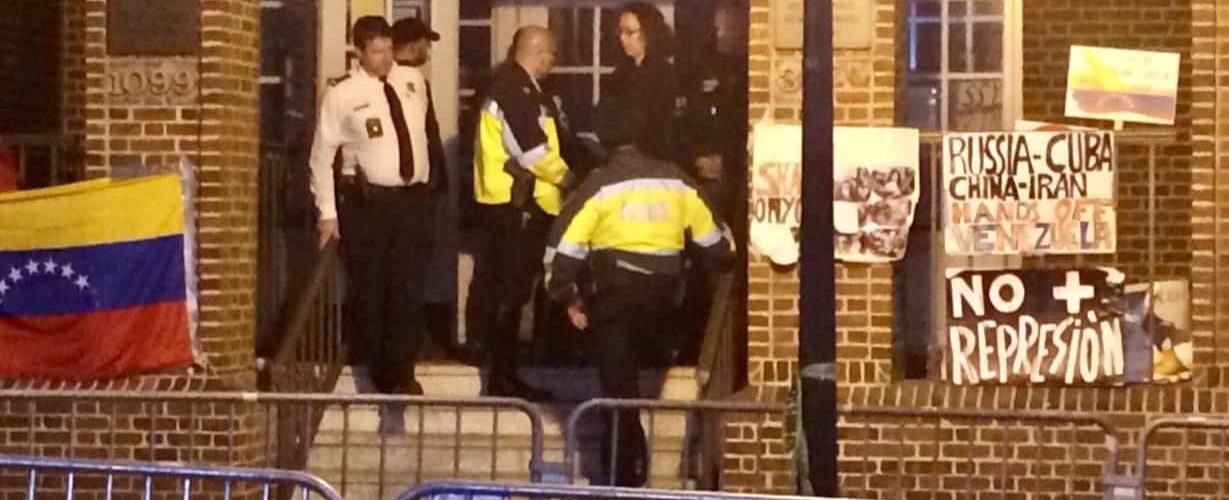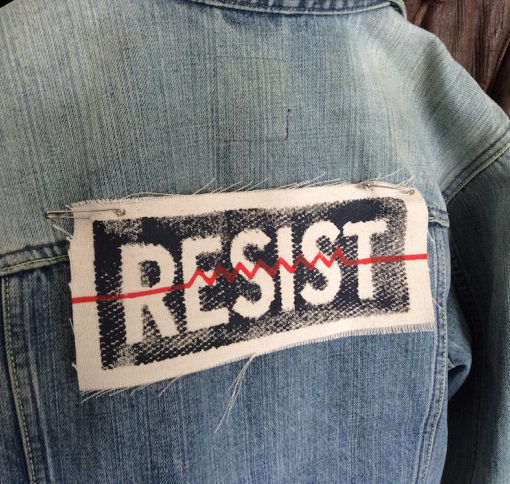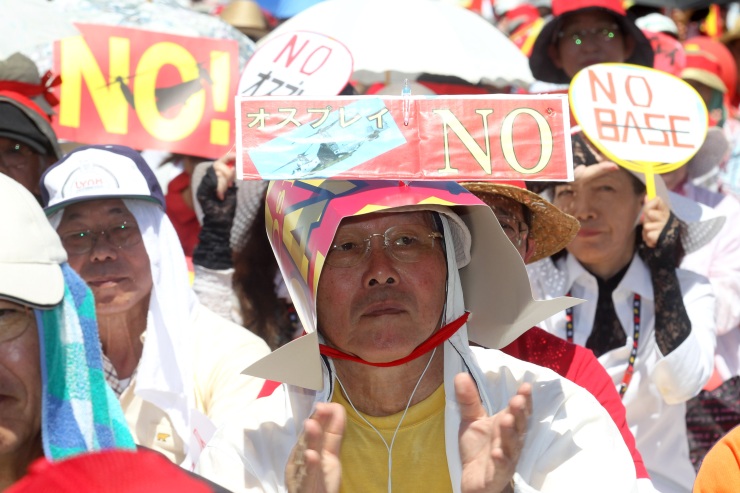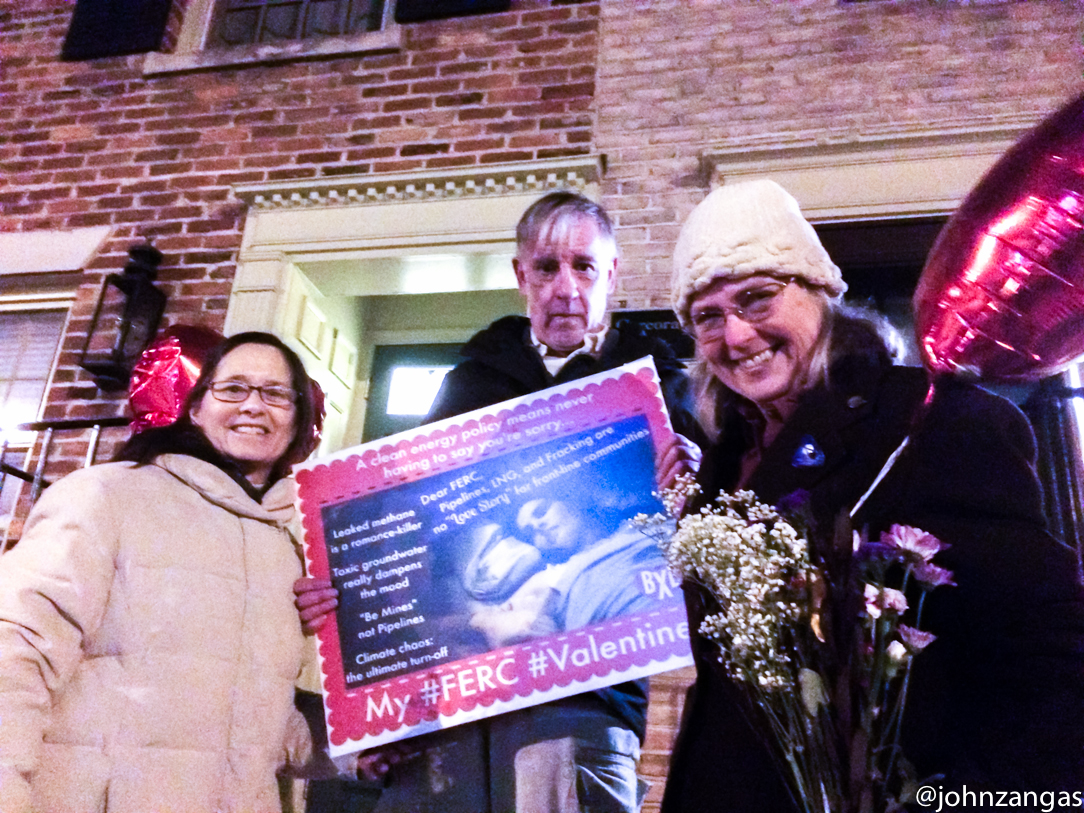Washington, DC–The opposition cheered as federal agents Monday night cut the chains on the front doors of the Venezuelan Embassy and prepared to raid the diplomatic mission. As they entered the dark building with flashlights to arrest activists for refusing to leave, it was unclear what would happen next. Such a raid would mark an unprecedented breach of the U.S. obligation involving the Vienna Convention of diplomatic relations and the inviolability of the Embassy. It would put the U.S. on an uncharted course of turning back international norms regarding diplomatic missions.
But the unthinkable happened. At about 2 hours into the raid federal agents were forced to stand down from the operation, although it appeared all but certain to activists that they would be arrested and charged with trespassing into an Embassy. Several journalists voluntarily left the Embassy Monday in anticipation of being arrested during an expected raid.
But Mara Verheyden-Hilliard, an attorney representing the activists interests at the Embassy, challenged the federal agents to explain what authority they had to enter the Embassy or to produce a warrant showing just cause to enter the building and arrest those inside. They had none.
Even the order agents had posted on the Embassy and later read over a loudspeaker, had no signature, no official stamp identifying the authority of the order, and no letterhead of authenticity. It was simply a laminated one-page statement Agents put up which could have been written by anyone. It looked official but it was not.
As Verheyden-Hilliard challenged the agents, they were forced to contend with the one legal choice they had left: request the activists leave of their own free will. The activists refused to leave.
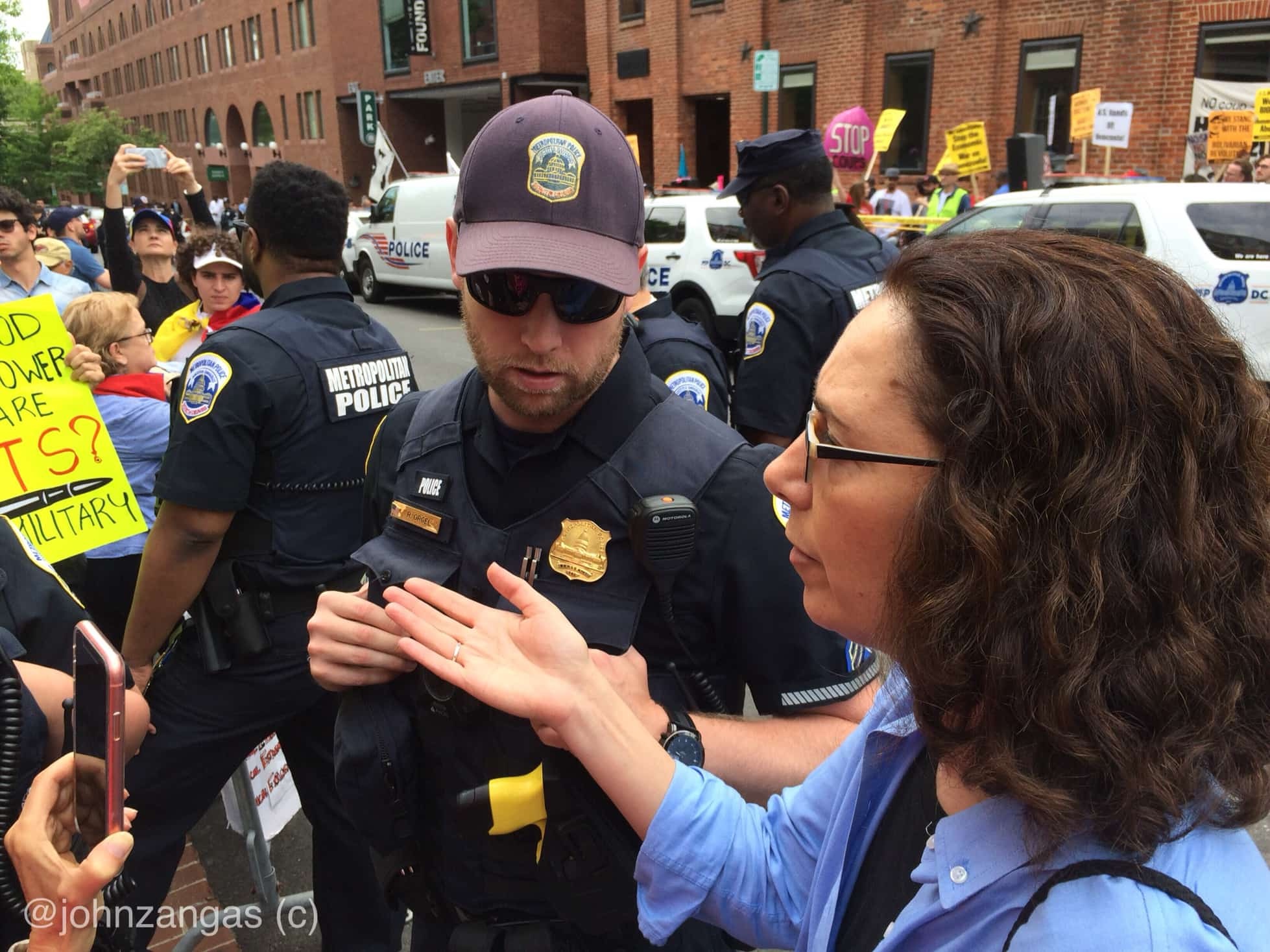
Outside opposition grew impatient as Carlos Vecchio and his staff, dressed in immaculate dark suits, stood waiting to take control of the Embassy. Agents were forced to leave the Embassy without arresting anyone or ending the standoff. Opposition repeatedly chanted “Fuera!” (Get out) but the night would pass with the activists still inside.
The four remaining activists Adrienne Pine, an anthropologist, Margaret Flowers, a pediatrician, Kevin Zeese, co-founder of Popular Resistance, and another activist. They released a joint recorded message in essence asserting their right as lawfully invited guests of the elected Bolivarian Government of Venezuela and stated any attempt to remove them would be a violation of the 1961 Vienna Convention on Diplomatic Relations.
The activists seemed to realize that with food almost gone and electricity and water now turned off since Thursday, another violation of the Vienna Convention, they had less wiggle room to remain inside. But with their numbers now diminished to four, their rations would go further. It would also be less complicated for federal agents to physically enter the Embassy to arrest and remove them.
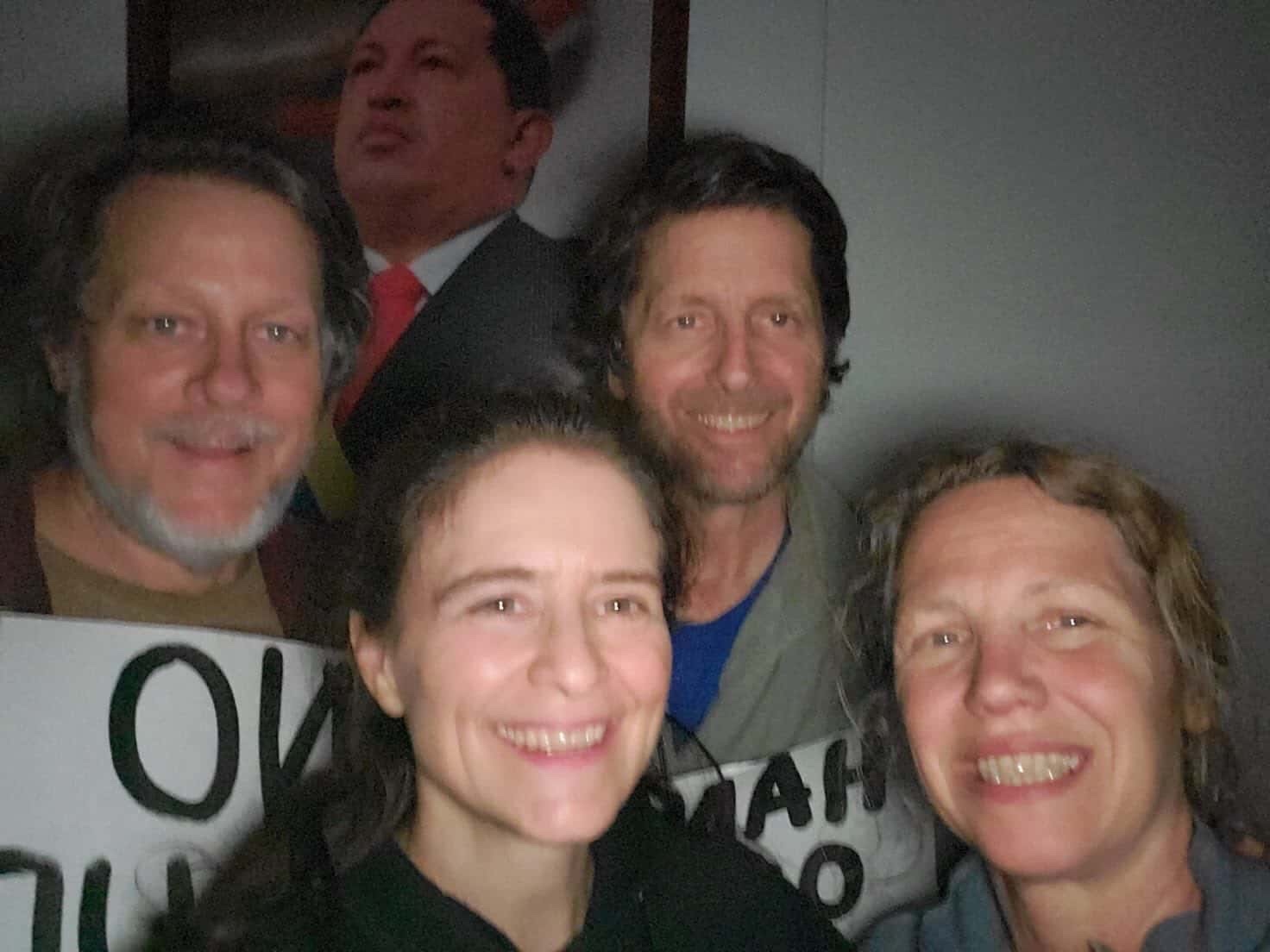
In a carefully worded letter to the State Department, the activists offered several conditions for voluntarily leaving the Embassy. It was as much a message of Peace as much as one based on diplomacy. They set forth the following conditions for their voluntary departure:
“This is the 34th day of our living in the Venezuelan embassy in Washington, DC. We are prepared to stay another 34 days, or however long is needed to resolve the embassy dispute in a peaceful way consistent with international law.
“This memo is being sent to the US and Venezuela as well as members of our Collective and allies. We are encouraging people to publish this memo as a transparent process is needed to prevent the US from making a unilateral decision that could impact the security of embassies around the world and lead to military conflict.
“There are two ways to resolve the issues around the Venezuelan embassy in DC, which we will explain.
“Before doing so, we reiterate that our collective is one of independent people and organizations not affiliated with any government. While we are all US citizens, we are not agents of the United States. While we are here with permission of the Venezuelan government, we are not their agents or representatives.
“We are here in the embassy lawfully. We are breaking no laws. We did not unlawfully enter and we are not trespassing.
“1. Exiting with a Protecting Power Agreement
The exit from the embassy that best resolves issues to the benefit of the United States and Venezuela is a mutual Protecting Power Agreement. The United States wants a Protecting Power for its embassy in Caracas. Venezuela wants a Protecting Power for its embassy in DC. Such agreements are not uncommon when diplomatic relations are severed.
“A Protecting Power Agreement would avoid a military conflict that could lead to war. A war in Venezuela would be catastrophic for Venezuela, the United States, and for the region. It would lead to lives lost and mass migration from the chaos and conflict of war. It would cost the United States trillions of dollars and become a quagmire involving allied countries around the world.
“We are serving as interim protectors in the hope that the two nations can negotiate this resolution. If this occurs we will take the banners off the building, pack our materials, and leave voluntarily. The electricity could be turned on and we will drive out.
“We suggest a video walk-through with embassy officials to show that the Embassy Protection Collective did not damage the building. The only damage to the building has been inflicted by coup supporters in the course of their unprosecuted break-ins.
“2. The United States violates the Vienna Convention, makes an illegal eviction and unlawful arrests
This approach will violate international law and is fraught with risks. The United States would have to cut the chains in the front door put up by embassy staff and violate the embassy. We have put up barriers there and at other entrances to protect us from constant break-ins and threats from the trespassers whom the police are permitting outside the embassy. The police’s failure to protect the embassy and the US citizens inside has forced us to take these actions.
“The Embassy Protectors will not barricade ourselves, or hide in the embassy in the event of an unlawful entry by police. We will gather together and peacefully assert our rights to remain in the building and uphold international law.
“Any order to vacate based on a request by coup conspirators that lack governing authority will not be a lawful order. The coup has failed multiple times in Venezuela. The elected government is recognized by the Venezuelan courts under Venezuelan law and by the United Nations under international law. An order by the US-appointed coup plotters would not be legal.
“Such an entry would put embassies around the world and in the United States at risk. We are concerned about US embassies and personnel around the world if the Vienna Convention is violated at this embassy. It would set a dangerous precedent that would likely be used against US embassies.
“If an illegal eviction and unlawful arrests are made, we will hold all decision-makers in the chain of command and all officers who enforce unlawful orders accountable.
“We have taken care of this embassy and request a video tour of the building before any arrests.
We hope a wise and calm solution to this issue can be achieved so escalation of this conflict can avoided.
“There is no need for the United States and Venezuela to be enemies. Resolving this embassy dispute diplomatically should lead to negotiations over other issues between the nations.
“The Embassy Protection Collective”

